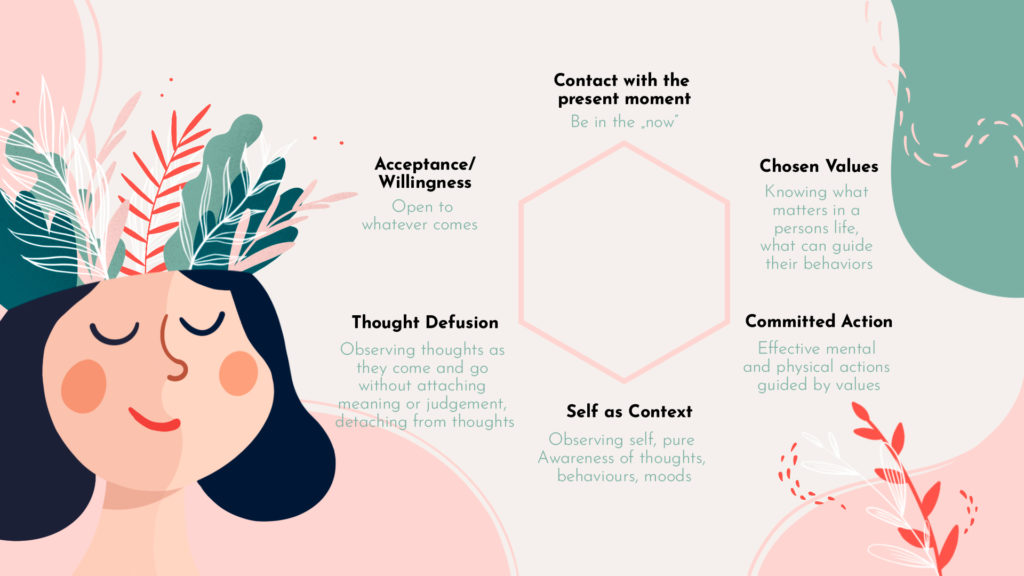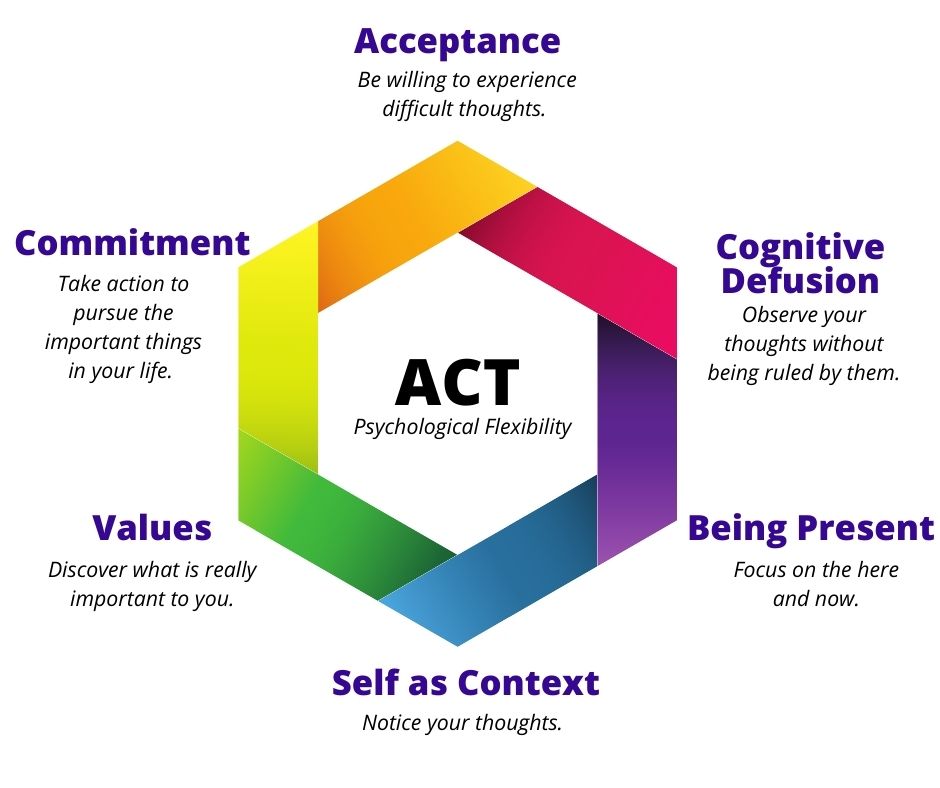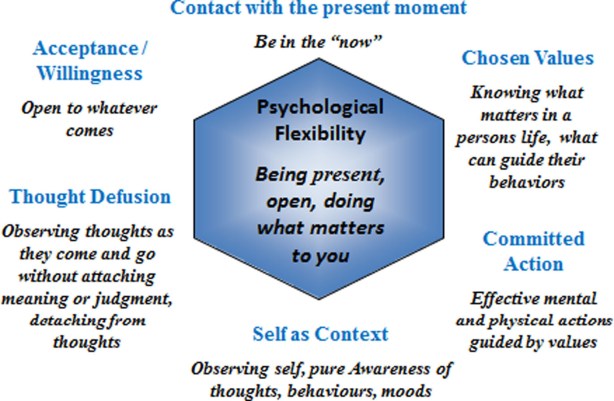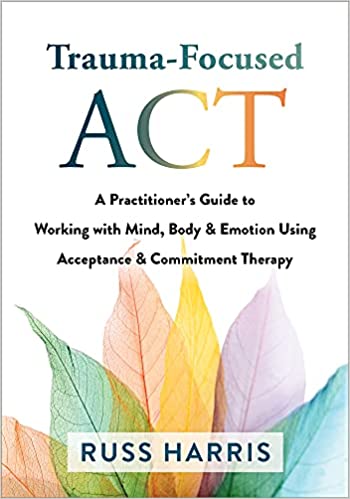ACT, or Acceptance Commitment Therapy, is a form of psychotherapy that has been growing in popularity in recent years. In this blog post, we will explore the concept of ACT acceptance commitment therapy, its application, and evaluation.
Contents
- 1 Understanding ACT Acceptance Commitment Therapy
- 2 Exploring 6 Core Processes Of ACT
- 3 Unfolding ACT Acceptance Commitment Therapy
- 4 Evaluating ACT Acceptance Commitment Therapy
- 5 Finding an ACT Acceptance Commitment Therapist
- 6 Pursuing Training In ACT
- 7 Hearing From Experts
- 8 Conclusion
- 9 A Word From Therapy Mantra
Understanding ACT Acceptance Commitment Therapy

ACT is a form of psychotherapy that was developed in the 1980s by Steven Hayes. It is based on the idea that many psychological problems are a result of our efforts to avoid discomfort and pain. The goal of ACT is to help people learn to accept their thoughts and feelings, rather than trying to fight them.
ACT is built on the idea that we have three main components to ourselves:
- thoughts
- feelings, and
- behaviors.
- Thoughts are defined as the content of our consciousness at any given moment. They can be positive or negative, helpful or unhelpful.
- Our feelings are the emotions we experience in response to our thoughts and experiences.
- And our behaviors are the things we do in response to our thoughts and feelings.
Theory Behind ACT Acceptance Commitment Therapy

ACT is based on the idea that psychological problems are caused by our efforts to avoid discomfort and pain. Thus, the goal of ACT is to help people learn to accept their thoughts and feelings, rather than trying to fight them. Now, this acceptance allows us to focus on the present moment and take actions that will improve our lives, rather than being a slave to our thoughts and feelings.
History And Development
ACT was developed in the 1980s by Steven Hayes. It is based on the idea that many psychological problems are caused by our efforts to avoid discomfort and pain. The goal of ACT is to help people learn to accept their thoughts and feelings, rather than trying to fight them.
This acceptance allows us to focus on the present moment and take actions that will improve our lives, rather than being controlled by our thoughts and feelings.
ACT is effective for a variety of psychological problems, including anxiety, depression, eating disorders, substance abuse, and chronic pain. It is also being used in schools to help students with academic performance and social skills.
Six-Core Processes of ACT
There are six core processes of ACT:
- Acceptance: This involves accepting our thoughts and feelings, rather than trying to fight them.
- Commitment: This means committing to taking actions that will improve our lives, even if we don’t feel like it.
- Defusion: This is the process of learning to view our thoughts as simply thoughts, rather than facts.
- Mindfulness: This involves being aware of our thoughts and feelings in the present moment, without judging them.
- Self-compassion: This means being kind and understanding towards ourselves, even when we’re experiencing difficult thoughts and feelings.
- Values: This involves clarifying what is important to us and making choices that are in line with our values.
Exploring 6 Core Processes Of ACT

We will explore each of these processes in more depth below.
Mindfulness And ACT
ACT places a strong emphasis on mindfulness, which is defined as a state of being aware of and attentive to the present moment. Mindfulness allows us to see our thoughts and feelings without judgment and to be accepting of them.
The goal of mindfulness is not to suppress or get rid of our thoughts and feelings, but rather to let them come and go without clinging to them. This can be a difficult task, as we are often very attached to our thoughts and feelings. However, mindfulness allows us to step back from our thoughts and see them for what they are: just thoughts.
Acceptance And ACT
Acceptance is another important component of mindfulness. This means that we accept our thoughts and feelings without trying to fight them. Acceptance does not mean that we like or agree with our thoughts and feelings, but rather that we allow them to exist without judging them.
One way to think about acceptance is to imagine that our thoughts and feelings are like clouds in the sky. Just as we can’t control the clouds, we can’t control our thoughts and feelings. However, we can observe them without judging them.
Cognitive Defusion And ACT
Cognitive defusion is another key process in the ACT. This refers to the idea of detaching from our thoughts. We do this by recognizing that thoughts are just thoughts, and they do not have to control us.
One way to achieve cognitive defusion is through mindfulness, as we discussed above. Another way to achieve cognitive defusion is through something called “thinking about thinking.”
This means that we take a step back from our thoughts and observe them. We can do this by asking ourselves questions such as “What am I thinking right now?” and “Why am I thinking this?”
Asking these questions can help us to see our thoughts more clearly and to understand that they are just thoughts, not reality.
Self-Awareness And ACT
Self-awareness is another important process in the ACT. This refers to the ability to be aware of our thoughts, feelings, and behaviors in the present moment.
Being self-aware allows us to see how our thoughts, feelings, and behaviors are affecting us in the present moment. It also allows us to make choices about our thoughts, feelings, and behaviors.
Values Clarification And ACT
Values clarification is the process of identifying what is important to us in life. This can be done by asking ourselves questions such as “What do I want out of life?” and “What is most important to me?”
Identifying our values can help us to make choices about our thoughts, feelings, and behaviors. For example, if we value relationships, we may choose to spend more time with family and friends. If we value health, we may choose to eat healthy foods and exercise.
Committed Action And ACT
The final process in the ACT is committed to action. This refers to taking actions that are aligned with our values.
Taking committed action can be difficult, as it requires us to do things that may be outside of our comfort zone. However, it is important to remember that we are not trying to get rid of our thoughts and feelings, but rather to live a life that is in line with our values.
Unfolding ACT Acceptance Commitment Therapy
ACT can be helpful for anyone who is struggling with psychological problems. It is also being used in schools to help students with academic performance and social skills.
Furthermore, ACT can be helpful for people who are struggling with a wide range of mental health issues. Such as anxiety, depression, substance abuse, eating disorders, and more.
What To Expect
During an ACT session, the therapist will help you to become more aware of your thoughts and feelings. They will also help you to learn how to accept them and let them go.
The therapist will also teach you how to be more self-aware and how to identify your values. Finally, the therapist will help you to take actions that are aligned with your values.
How Does It Work
ACT works by teaching us how to accept our thoughts and feelings and to make choices that are in line with our values.
ACT is based on the idea that it is not our thoughts and feelings that cause problems in our lives, but rather our relationship with them.
By learning how to accept our thoughts and feelings and make choices that are in line with our values, we can live a more fulfilling and meaningful life.
Techniques Used In Acceptance Commitment Therapy

Many different techniques can be used in ACT. Some of these techniques include mindfulness, cognitive defusion, self-awareness, and values clarification.
Mindfulness
It is a technique that can be used in ACT. Mindfulness refers to the ability to be aware of our thoughts and feelings in the present moment without judging them.
One way to achieve mindfulness is through meditation. Meditation can help us to focus on our breath and to become more aware of our thoughts and feelings.
Cognitive Defusion
Cognitive defusion is another technique that can be used in ACT. This refers to the process of separating our thoughts from our reality.
One way to achieve cognitive defusion is through mindfulness, as we discussed above. Another way to achieve cognitive defusion is through something called “thinking about thinking.”
Thinking about thinking refers to the process of observing our thoughts without judging them. This can be done by asking ourselves questions such as “What am I thinking right now?” and “Is this thought true?”
Self-Awareness
As we discussed earlier, self-awareness is another important part of ACT. Self-awareness refers to the ability to be aware of our thoughts, feelings, and behaviors in the present moment.
One way to achieve self-awareness is through mindfulness, as we discussed above. Another way to achieve self-awareness is through something called “ checking in with ourselves.”
Checking in with ourselves refers to the process of taking a moment to notice how we are feeling physically, emotionally, and mentally.
Values Clarification
Values clarification is another technique that can be used in ACT. This refers to the process of identifying our values and making choices that are in line with them.
One way to achieve values clarification is through “value cards.” Value cards are a tool that can help us identify our values.
Another way to achieve values clarification is through “values sorts.” Values sorts are a tool that can help us identify our values and make choices that are in line with them.
Evaluating ACT Acceptance Commitment Therapy

There are many different ways to evaluate ACT.
- One way to evaluate ACT is through something called the “ACT Matrix.” The ACT Matrix is a tool that can help us understand the six core processes of ACT.
- Another way to evaluate ACT is through something called the “ACT Process Model.” The ACT Process Model is a tool that can help us understand how ACT works.
Furthermore, ACT is effective in several studies. For instance:
- One study show ACT is more effective than CBT in treating anxiety and depression.
- Another study show ACT is more effective than medication in treating substance abuse.
Benefits of ACT
ACT has several benefits. However, some of these benefits include:
- Helping us to accept our thoughts and feelings
- Teaching us how to make choices that are in line with our values
- Helping us to live a more fulfilling and meaningful life
Limitations of ACT
ACT is not without its limitations. However, some of these limitations include:
- Can be difficult to learn and implement
- May not be appropriate for all people
- May not be covered by insurance
Why Consider It
If you are struggling with psychological problems, ACT may be a good option for you. Moreover, it is an evidence-based treatment that is effective in treating a wide range of mental health issues.
Though ACT can be difficult to learn and implement, it can help you to live a more fulfilling and meaningful life.
Finding an ACT Acceptance Commitment Therapist
If you have an interest in finding an ACT therapist, there are a few things to keep in mind.
How To Find One
When looking for an ACT therapist, you can:
- ask your doctor or mental health professional for a referral to an ACT therapist.
- also, search online directories such as the Association for Contextual Behavioral Science.
What To Look Out For
When looking for an ACT therapist, there are a few things to look out for. For instance:
- First, you should make sure that the therapist has training and experience in the ACT.
- Second, you should make sure that the therapist is someone you feel comfortable with.
- Third, you should make sure that the therapist is covered by your insurance.
Pursuing Training In ACT
If you have an interest in pursuing training in ACT, there are a few things to keep in mind. For instance:
- First, it is important to find a training program that has accreditation by the Association for Contextual Behavioral Science.
- Second, it is important to make sure that the training program is right for you.
- Third, it is important to make sure that you have the time and resources to commit to the training program.
Hearing From Experts

“ACT has the potential to change lives. It is a powerful tool that can help people to accept their thoughts and feelings and to make choices that are in line with their values.”
-Dr. Steven Hayes, Professor of Psychology at the University of Nevada
“ACT is a promising treatment for many mental health issues. If you are struggling with a mental health issue, you may want to consider the ACT.”
-Dr. John Grohol, Psych Central Founder and CEO
Case Study
John is a 38-year-old man who has been struggling with depression for many years. He has tried medication and therapy, but nothing has seemed to help. Then John’s wife suggested that he try ACT.
John met with an ACT therapist and found that he was able to connect with her and that she was covered by his insurance. Now, John began attending weekly sessions with his therapist.
Subsequently, John found that ACT helped manage his depression. Furthermore, he learned how to accept his thoughts and feelings and to make choices that were in line with his values.
Resources

If you have an interest in learning more about ACT, there are a few resources that you can check out. For instance:
- The Association for Contextual Behavioral Science: This website provides information on ACT and other related therapies.
- ACT Made Simple: This book provides an introduction to ACT and is written by an experienced ACT therapist.
- Get Out of Your Mind and Into Your Life: This book is written by the founder of ACT and provides an overview of the therapy.
Conclusion
ACT Acceptance Commitment Therapy is a promising approach to mental health that has shown to be effective in treating a variety of conditions. So if you are considering therapy, it is important to find a qualified therapist who can help you understand and implement the six core processes of ACT. While there are some limitations to the approach, the benefits of ACT far outweigh the drawbacks. However, with proper guidance and support, ACT can help you live a more fulfilling and meaningful life.
A Word From Therapy Mantra
Your mental health — Your psychological, emotional, and social well-being — has an impact on every aspect of your life. Positive mental health essentially allows you to effectively deal with life’s everyday challenges.
At TherapyMantra, we have a team of therapists who provide affordable online therapy to assist you with issues such as depression, anxiety, stress, workplace Issues, addiction, relationship, OCD, LGBTQ, and PTSD. You can book a free therapy or download our free Android or iOS app.


